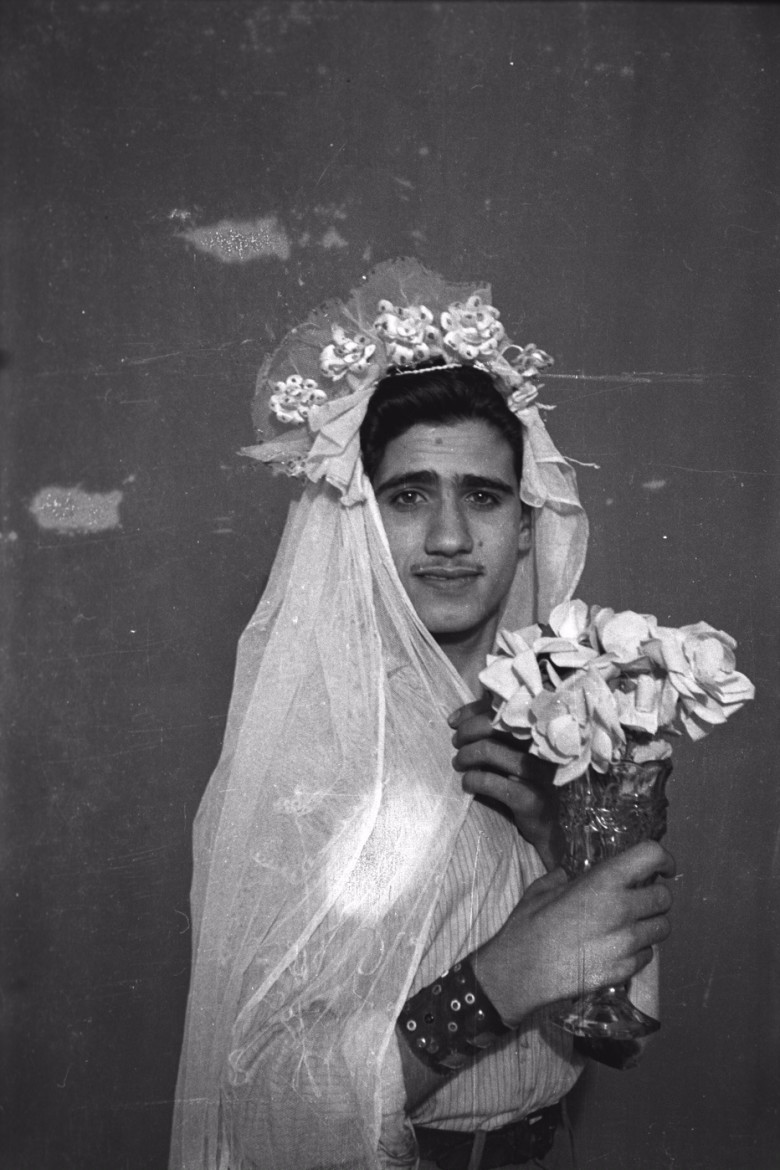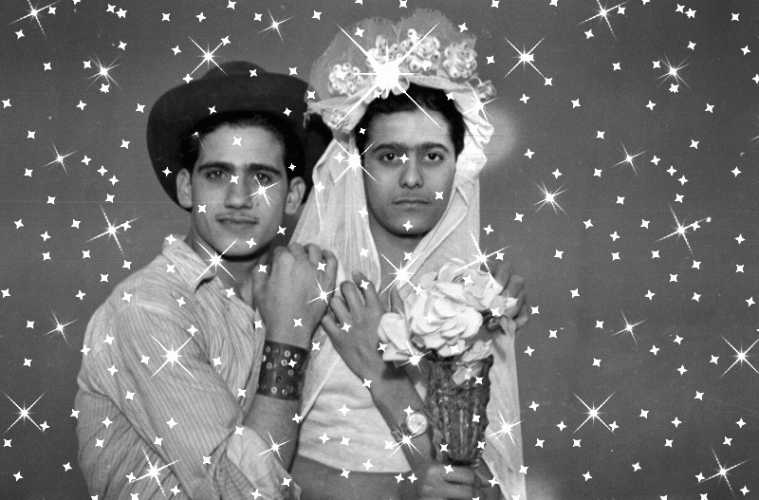Words: Ayman Huda Menem
Image: Ayman (right) and Najm (left). © Akram Zaatari. From Hashem el Madani, courtesy of the Arab Image Foundation, Beirut.
This article is part of the “Marriage & Weddings” issue.
In Egypt and some Gulf countries, weddings have a monopoly on the word farha1. This is neither innocent nor objective, but instead conveys the ideals of society, represented by the state and acceptable religious institutions, in which there is no room for single people. The exclusion of single or unmarried people is further emphasized when you realize that the phrase “starting out in life” is used to describe those who plan to get married. The situation in Egypt, which does not differ greatly from the state of other countries in the region, reveals the extent to which marriage occupies the deeply symbolic and spiritual infrastructure of its people and humanity at large.
Marriage, which has changed form and models through human history, is now considered to be the most acceptable form of union because it complies with norms regarding appropriate sexual/emotional relations between men and women and is aimed at starting a family. Further, it is the only avenue through which one can obtain their full rights and recognition from the state.
The concept of marriage has continued to expand and shift as Western framework grows to include same sex marriage. It is considered to be the only and most ideal way of establishing a union between two individuals, no matter their sexuality or gender, that is legally recognized and supported by societal institutions, and that guarantees legal protection for both parties and the benefits and rights that heterosexual married couples enjoy.
Freedom and equality without discrimination, including that based on sex, are at the core of the concept of human rights, though there is no specific path to ensure that those values are upheld. It is in this context, one also characterized by a Western binary view of humanity (good vs. evil, West vs. rest), that same sex marriage is framed and presented as the pinnacle of all struggles and the ultimate symbol of the globalization of human rights. Argued through rhetoric of ‘civilization’ and ‘progress’2.
However, rhetoric around same-sex marriage as a human rights is controversial, largely because Western discourse authorizes and governs cultural perceptions and public awareness of human rights and freedoms globally. Some argue that same-sex legislation is in fact a continuation of the oldest forms of domination, which controlled gender and sexuality along certain models, practices, and frameworks within a masculine -feminine binary. But, Western models based on binary logics are not the only to have existed, and one could argue that expanding the institution of marriage actually domesticated the LGBTQ+ community, pushing them into ‘family institutions’ that align them within norms of the patriarchal system. It further reproduces the social, political, economic and religious institutions that ensure the continuity of the structures that govern society, including government, the education system, commercial institutions, and that marginalize those with less social capital, such as women and sexual minorities.Same-sex marriage can, in certain cases, be considered another legal mechanism of social control aimed to transform or hem in the social body through (a) punishment, as represented by non-recognition, ostracization, and social/legal disregard, and (b) reward, by granting material and social rights to those who comply with the majority’s norms and the human/societal norms embedded in the nuclear family model. This nuclear family model shores up conceptually- and practically-allied ideologies of neoliberalism and social conservatism through defining it as the basic social unit through which the new working class is reproduced, the relationships between class, production, circulation, and consumption are streamlined, and consumer culture in general is promoted3.
LGBTQ+ Culture
Again, there is a central contradiction at play in discussing same-sex legislation. On one hand, discourses around the replication or extension of the institution of heterosexual marriage are framed by a rhetoric of inclusion and incorporating the LGBT+ community into this “ancient institution,” and are assumed to be an inclusive alternative to the core concepts of patriarchy that would contribute to its subversion. But on the other, this ancient institution is characterized by traditional family structures, inherited societal expectations and social roles is just another appendage of the heterosexual patriarchal system and its normative frameworks outlining the form and nature of social relationships in modernity.
It is often assumed that attempts for societal change, whether through the will of the people or through the political, social, and religious violence directed toward them, opens up new social space and introduces new social structures and rules that move in a positive direction. In theory, pushing for same-sex legislation promotes transcending the nuclear family unit and defines family ties anew, to be based on values of equality, freedom of choice, and justice rather than blood ties or legal recognition. This creates advocacy and support networks, as well as human-to-human bonds through which members of the LGBT+ community can share security and independence together, and establish a global LGBT+ culture structure.
However, aspirations for inclusion and a sustainable alternative to heteronormative and patriarchal family structures has proved too good to be true. Nearly two decades after the first gay marriage legislation in the Netherlands4, the decline of a unified LGBTQ+ culture and the institutions and norms associated has become evident. Same-sex marriage legislation and its legal normalization has, rather than promoting true inclusion or recognition, reduced the LGBTQ+ community’s and its members’ identities to celebrations and commercial opportunities. With incorporation, there is also a broad denial of the need to engage with groups based on sexual orientation, especially those marginalized because of it, and denial of the need for organizing and social struggle for rights and acceptance of people with different sexualities and genders. What is recognized instead is economic interest and political affiliation, which ultimately reveal the socio-economic stratification that often underlies conflicts within the movement5.
Additionally, one cannot assume that adopting the standardization of legal or social models based on Western cultural systems yields positive outcomes or substantive change. For example, in 2018, the ruling regime in Cuba made a constitutional amendment including the right to marry, and establishing a committee to approve same-sex marriage within two years. This was in an effort to open up markets and invite foreign investments by demonstrating socially-progressive policies6. The amendment did not include any change to the fundamental nature of the political system or the system of rights and freedoms, and did not lead to change in the behavior of the State and its institutions that structure legal and social action. The State prevented a gay pride march in 2019, and practiced physical violence and detention against violators of the ban7. And, it still refuses to deal with crimes against humanity committed in 1960s, when 800 queer people were killed in forced labor and “re-education” camps, content instead with the statement of former President Fidel Castro taking responsibility for these atrocities in 2010 rather than issuing an official apology or material compensation, or reforming the justice system8. It seems that the international media celebration of the amendment was a premature one.
“…rhetoric around same-sex marriage as a human rights is controversial, largely because Western discourse authorizes and governs cultural perceptions and public awareness of human rights and freedoms globally.”

Najm posing with wedding dress. Photo by Hashem el Madani, Studio Shehrazade, Saida, 1950s, 2015,
In Our Countries
In our countries, it may seem irrelevant to talk about same-sex marriage given the prevailing view that sexuality from a prohibitive perspective and dismisses Arabic-speaking peoples’ experiences of it. The patriarchy is well-entrenched in the social and psychological structures that govern the state and society, as seen in the resistance to change and maintenance of traditional social structures, values, and ties of blood, family, and tribe, and in the resulting hierarchical perceptions based on authoritarianism and submission to it, which contradicts values of equality, freedom, and modernity in general. Perhaps the Arab system is among the few remaining that still bestows the title of “father-leader” on rulers, a title that demands absolute loyalty from its citizens.
However, resistance social change in the region, the impossibility of same-sex legislation, and controversy surrounding even the idea of it do not prevent the topic from occupying a significant space in the arena of public debate, likely due to Western hegemony and the lack of knowledge production in contemporary national spaces. Because of this, same-sex marriage has become an object of legislation by authoritarian decision or popular referendum. In any part of the world, same-sex legislation might be cause for celebration and a chance to spread the colors of the rainbow on internet platforms, which becomes a tool to shape public knowledge and delineate appropriate behavior and perspectives. But despite serving this function and providing members of the LGBTQ+ community in the region a space of freedom, activity these virtual spaces often relegates their struggle to an object of sympathy, cloned festivities, or code. At the same time as these moments of freedom and celebrations and virtual spaces, the state often exploits the matter and arrests members of the LGBTQ+ community for allegedly conducting same-sex marriage ceremonies, depicting this as a requirement of the LGBTQ+ rights movement and thus reducing awareness about homosexuality or the movement at large.
The belief that the celebration of marriage legislation online is the pinnacle of the online human rights struggle, that it will lead to the ultimate adoption by a wide range of institutions and activists around gender and sexual minorities in the region, reflects the absence of space needed to build a modernist democratic infrastructure, the disconnect between the discourse it adopts and the real problems of society, and the gap between these civil society groups and the culture of the majority. In other words, the class that arose to head Western-funded agencies and adopted liberal Western ideologies regarding personal and civil rights are those leading and speaking from research, media, and advocacy networks and institutions, and are not necessarily authorized by the majority of those who they speak for or aim to represent. Taking on such a liberal discourse without looking at the current complexities in implementing it means inadvertently relegating the struggle of LGBT+ people to a specific path with a fixed goal, whilst overlooking the forms of societal repression and economic strife that these same people face. One must take a more comprehensive view, then, to realize that the problems of the LGBTQ+ community can neither be reduced to silence or overlooked in terms of recognition and rights. There are intersections in the forms and systems of oppression, domination and discrimination that they face along axes of race, religion, socio-economic class, and sexual orientation and gender expression.
The struggle of the LGBTQ+ community cannot be separated from other movements for change that make up the political and social transformations taking place across the region, in which large numbers of the population come together in the call for equality, full and effective citizenship, and recognition of rights and freedoms. These majoritarian calls appear to be leading toward the dismantling of the patriarchal authority and deeply-entrenched oppressive societal norms. With each step they reveal the pretext of social repression based on gender roles and relationships, and eliminate the possibility for further legal persecution based on these human-made laws.

